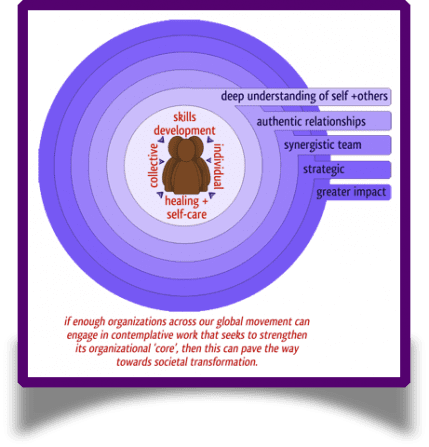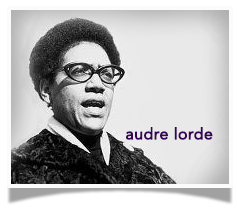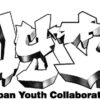Self-Neglect as Service
 The work imperative within social justice organizations – taking action (working) as much as possible – ironically & tragically ends up sabotaging an organization’s capacity for effective action. We push ourselves, our work, & those around us, becoming increasingly ineffectual because we have not stopped to replenish our physical, emotional & mental health. This deterioration promotes cynicism, strains temperance & trust within relationships, & thus diminishes both our desire & our ability for collective vision & action.
The work imperative within social justice organizations – taking action (working) as much as possible – ironically & tragically ends up sabotaging an organization’s capacity for effective action. We push ourselves, our work, & those around us, becoming increasingly ineffectual because we have not stopped to replenish our physical, emotional & mental health. This deterioration promotes cynicism, strains temperance & trust within relationships, & thus diminishes both our desire & our ability for collective vision & action.
This same cycle of self-neglecting service is also pervasive within oppressed communities, as citizens take on the burdens of economic & social disparity. Many of us come to this work because we, or the people we love, have experienced deep injustice. These experiences shape a negative understanding of our self-worth & potential for empowered action. When instinctual mistrust of ourselves & others goes unchallenged, we end up taking actions that reinforce/recycle the wounds of oppression within ourselves & within our relationships.
At the heart of this dynamic is the thinking that self-care is an indulgence. In the social justice work ethic, it is a waste of otherwise productive time. At the “macho” end of this thinking, self-care can even be seen as harmful; making us less effective by “softening” the rigidity of our focus & resolve. Most importantly, behind these canards lies an oppressed worldview – internalized from our own experiences and/or from the communities we serve – that convinces us we do not deserve it.
Our self- & community-narratives are a psychological state, but also significantly shape our emotional state, or mood. Finally, both of these shape our very bodies, as pessimistic thoughts & emotions bend our postures & lower our heads. Going the opposite direction, the stresses we put on our bodies produce moods that sour our opinion of ourselves, relationships, organizations & communities.
It is hard to imagine that liberated individuals, communities, societies or worlds can emerge from these broken fragments that make up the individual & collective bodies driving the work today.
Shifting the Paradigm
 In the venerable words of Audre Lorde’s radical self-love,“Caring for myself is not self-indulgence, it is self-preservation & that is an act of political warfare.”
In the venerable words of Audre Lorde’s radical self-love,“Caring for myself is not self-indulgence, it is self-preservation & that is an act of political warfare.”
UP’s approach to social change, ignited & sustained by social change agents, seeks to push this ethos to the outer most edge. We want to challenge movements & change makers to claim our individual & collective beings as shaped by the very systems of oppression & injustice that we fight against. Without self-reflection & understanding that we, too, are a product of these insidious cultures & systems as are the materials conditions that our communities & the communities we fight for are living in, we cannot begin to imagine & change our society & world to be more just & equitable. At least not in a long lasting, sustainable way. We believe that each of us needs self-care, healing, & transformation to become the embodied leaders our visions require us to be.
No longer can we drive ourselves, beyond our capacity, & expect that our own trauma, our own shaping, will not rise to the surface & overshadow our good work & principles. We must understand our individual, organizational & community’s historical shaping as the basis of reinventing our selves & our leadership as the methodology towards deep societal change.
Our approach, in this respect, is simple- we believe changing you is changing the world. That self-reflection, -work & -transformation are the most radical change any one individual can commit. Our work deeply integrates this approach on every level & kind of training & development work we do.





Recent Comments